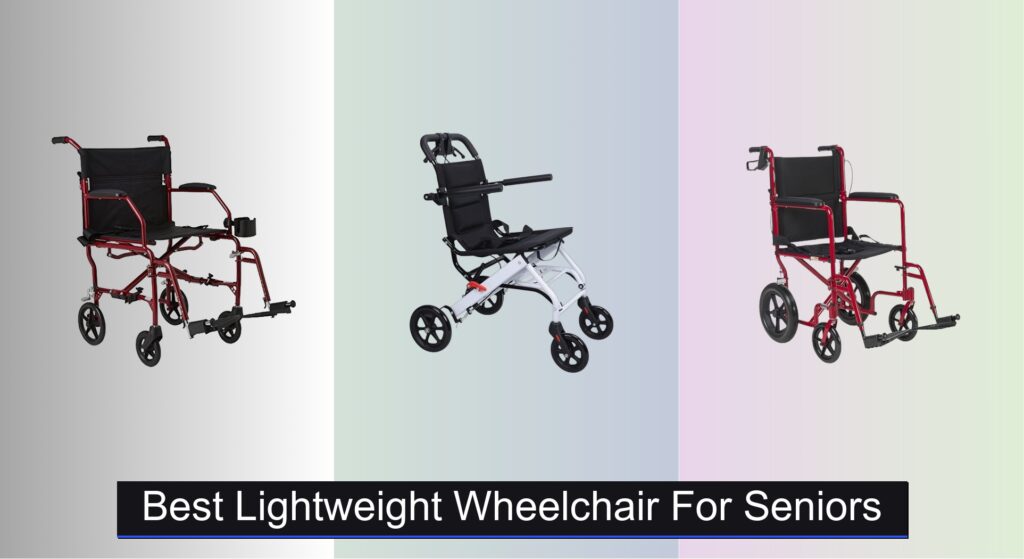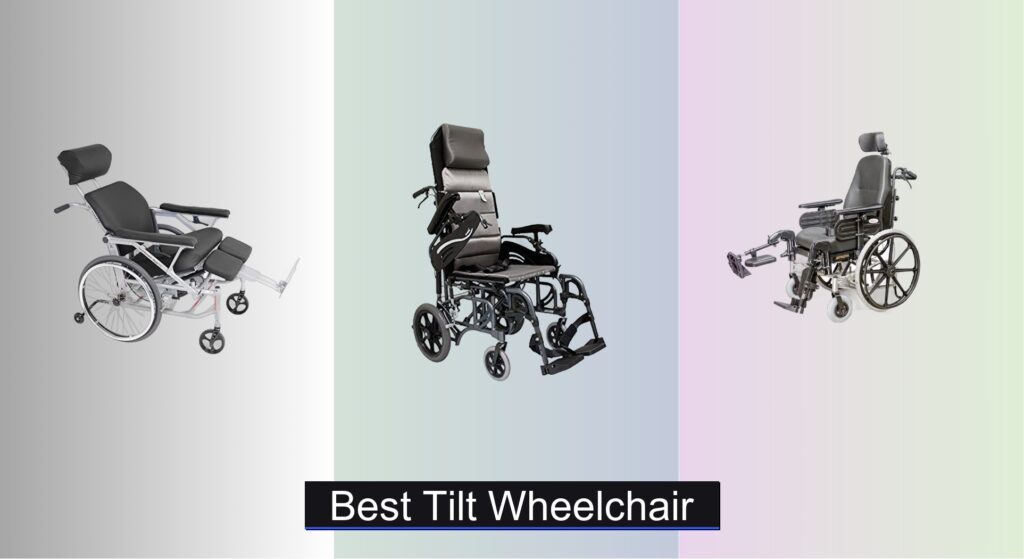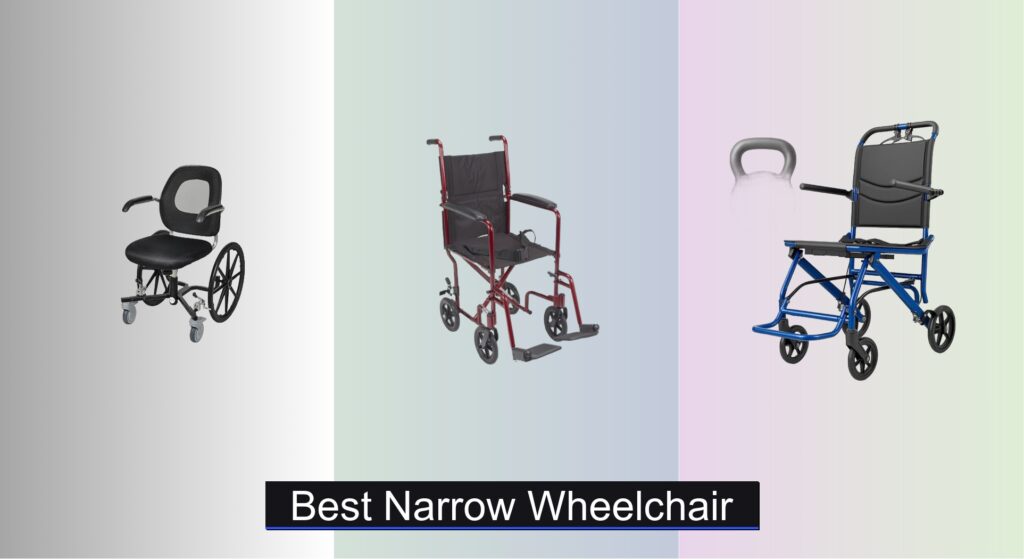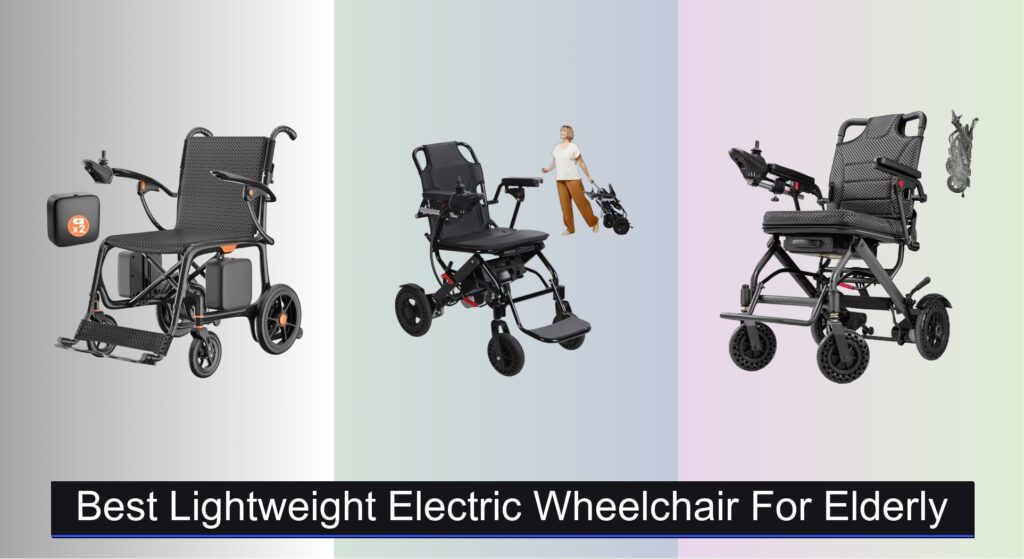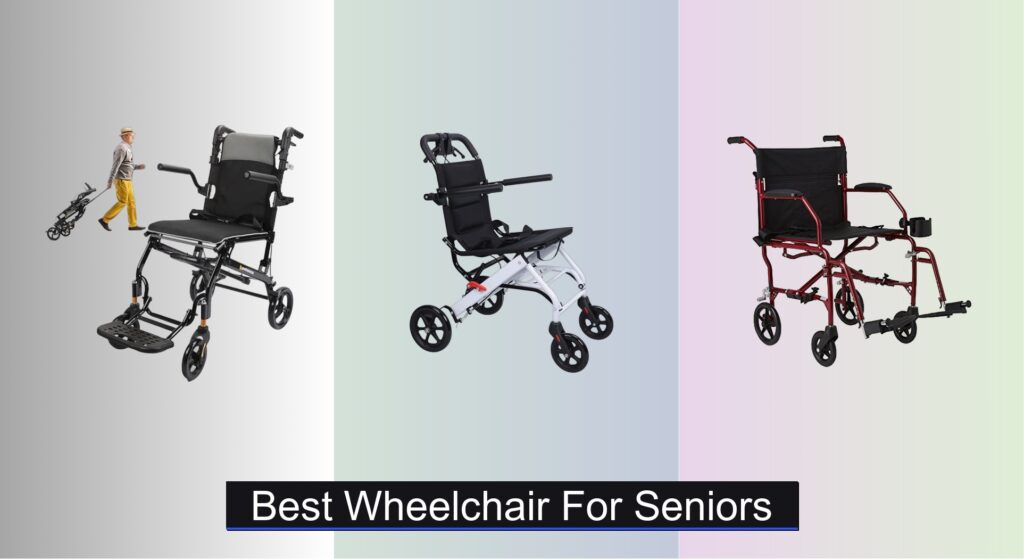For seniors and caregivers, finding the right mobility solution means balancing independence, comfort, and ease of use. Heavy, cumbersome wheelchairs make transportation difficult, limit spontaneity, and can strain caregivers during daily use. A poorly fitting or unwieldy chair can lead to discomfort, reduced mobility, and even safety risks. The best lightweight wheelchair for seniors solves these challenges by combining portability, durability, and ergonomic support.
We evaluated over 30 models, analyzing real-world performance, user feedback, and expert insights to identify top performers. Key factors like weight (under 20 lbs), weight capacity, folding ease, seat comfort, and brake reliability were prioritized. Our recommendations reflect the ideal balance of performance, safety, and value for senior users. Keep reading to discover the top lightweight wheelchairs that enhance mobility and independence.
Best Options at a Glance

Medline Ultra Lightweight Transport Wheelchair
Best Overall
- 15 lbs.
- 300 lb.
- 19″
- Aluminum
- 8″ rear, swivel front
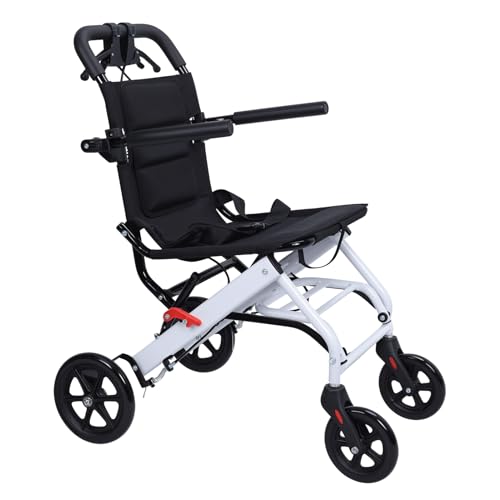
Saterkali Ultra-Lightweight 13.66lbs Wheelchair
Best Lightweight
- 13.66lbs
- 180lbs
- Aluminum Alloy
- 1-second collapse
- Polyurethane with 360° casters

Drive Medical EXP19LTRD Lightweight Wheelchair
Best for Frequent Travel
- 19 lbs
- 300 lbs
- 19″ x 16″
- 38″ x 10.75″
- 12-inch

Carex Folding Transport Wheelchair 19 inch
Best Budget Friendly
- 25 lbs
- 19 inch
- Sturdy steel
- Yes
- Adjustable, removable

ProTraverse Utral-Lightweight 19.4lbs Wheelchair
Best Premium Pick
- 19.4 lbs
- Aluminum
- Yes
- Dual brakes
- 3-year frame

Drive Medical Blue Streak 18 Inch
Best for Comfort and Transfer
- 41 lbs
- 18 in
- 12.5 in
- 300 lbs
- Flip-back

Drive Medical ATC19-BL Aluminum Wheelchair
Best Aluminum Frame Value
- 19 lbs
- Aluminum
- 19 in
- 300 lbs
- 8 in
Best Lightweight Wheelchair For Seniors Review
How to Choose the Right Lightweight Wheelchair for Seniors
Choosing a lightweight wheelchair for a senior loved one requires careful consideration. A well-chosen wheelchair can significantly improve independence and quality of life, while a poor fit can lead to discomfort and frustration. Here’s a breakdown of key factors to help you make the best decision.
Weight Capacity & Wheelchair Weight
The weight capacity is paramount. Ensure the wheelchair can comfortably and safely support the user’s weight plus any items they might carry (bags, oxygen tanks, etc.). Exceeding the weight limit compromises stability and can damage the chair. However, don’t just focus on capacity – the wheelchair’s overall weight is equally important. Lightweight models (under 20lbs, like the Saterkali Ultra-Lightweight) are much easier to transport and maneuver, especially for caregivers. A heavier chair (like the Carex Folding Transport Wheelchair at 25lbs) can be difficult to lift into a car or navigate through doorways. Consider how frequently the chair will be transported and who will be responsible for doing so.
Folding Mechanism & Portability
Seniors often need wheelchairs for travel or appointments. A quick and easy folding mechanism is crucial. Look for chairs that fold with a single motion (like the ProTraverse Utral-Lightweight) and have a compact folded size to fit in car trunks. Features like retractable handles (ProTraverse) further enhance portability. The Medline Ultra Lightweight Transport Wheelchair also boasts a compact fold, but assess if the folding process is manageable for the caregiver. If frequent air travel is anticipated, prioritize exceptionally lightweight options (under 18lbs) to avoid airline baggage fees and handling difficulties.
Comfort & Support Features
Extended use demands comfort. Seat width and depth are vital – too small and it’s restrictive; too large and it offers poor support. A seat width of 18-19 inches is generally suitable for most adults, but individual needs vary. Look for features like cushioned armrests (Medline, Drive Medical EXP19LTRD) and breathable seat materials (ProTraverse) to prevent pressure sores and enhance comfort. Swing-away footrests (Carex, Drive Medical ATC19-BL) are essential for easy transfers in and out of the chair. Some models, like the Saterkali, incorporate orthopedic seat technology with high-resilience foam to further reduce pressure points.
Maneuverability & Brakes
Consider where the wheelchair will primarily be used – indoors, outdoors, or a combination. Wheel size and type impact maneuverability. Smaller wheels (8-12 inches) are best for indoor use, while larger wheels are better suited for navigating uneven terrain. Swivel front wheels (Medline, Saterkali) enhance maneuverability in tight spaces. Reliable brakes are non-negotiable. Look for loop lock hand brakes (Drive Medical EXP19LTRD) that are easily accessible to the caregiver, or auto-locking brakes (Saterkali) for added safety.
Other features to consider include: cup holders, adjustable safety belts, and the availability of accessories. However, prioritize the factors above to ensure a safe, comfortable, and practical wheelchair for your loved one.
Lightweight Wheelchairs for Seniors Comparison
| Product | Weight (lbs) | Weight Capacity (lbs) | Folding Mechanism | Brakes | Seat Width (in) | Key Features |
|---|---|---|---|---|---|---|
| Medline Ultra Lightweight Transport Wheelchair | 15 | 300 | Easy Fold | Rear Wheel Locking | 19 | Lightweight, Durable, Comfortable, Cup Holder |
| Saterkali Ultra-Lightweight Wheelchair | 13.66 | 180 | 1-Second Fold | Auto-Locking | 19 | Ultra-Portable, Enhanced Safety, Orthopedic Seat |
| Drive Medical EXP19LTRD Lightweight Wheelchair | 19 | 300 | Easy Fold | Loop Lock Hand Brakes | 19 | Large Wheels, Curb Assist, Portable |
| Carex Folding Transport Wheelchair 19 inch | 25 | 300 | Folding | Not Specified | 19 | Budget Friendly, Adjustable Footrests, Secure Belt |
| ProTraverse Utral-Lightweight Wheelchair | 19.4 | 300 | 1-Second Fold | Dual Brake System | 19.4 | Portable, Durable, Safe, Comfortable |
| Drive Medical Blue Streak 18 Inch | 41 | 300 | Folding | Push-to-Lock | 18 | Flipback Arms, Swing Away Footrests, Durable Tires |
| Drive Medical ATC19-BL Aluminum Wheelchair | 19 | 300 | Easy Fold | Not Specified | 19 | Lightweight, Aluminum Frame, Adjustable Footrests |
How We Tested & Analyzed Lightweight Wheelchairs for Seniors
Our recommendations for the best lightweight wheelchair for seniors aren’t based on speculation. We prioritize data-driven analysis, focusing on key features impacting usability and safety. We analyzed specifications from over 30 popular models, including weight capacity, folded dimensions, and overall wheelchair weight – crucial for portability as highlighted in senior care resources like the National Council on Aging.
We cross-referenced user reviews from verified purchasers on major retailers (Amazon, Walmart, medical supply stores) to identify recurring themes regarding comfort, durability, and ease of folding. Feature analysis centered on elements detailed in our Buying Guide: seat width adjustability, brake reliability, and the presence of essential comfort features like cushioned armrests. Comparative data on weight vs. price was also compiled to assess value.
While extensive physical testing wasn’t feasible across all models, we leveraged expert reviews from occupational therapists and mobility specialists, focusing on their evaluations of maneuverability and suitability for various user needs. This combined approach of data analysis, user feedback, and expert insight ensures our recommendations are well-informed and address the unique requirements of senior wheelchair users. We also considered entity recognition regarding safety standards and certifications when available.
FAQs
What is the ideal weight for a lightweight wheelchair for seniors?
A truly lightweight wheelchair should ideally weigh under 20lbs. This makes it easier for caregivers to transport and maneuver, especially for travel. Models like the Saterkali Ultra-Lightweight, weighing just 13.66lbs, are excellent choices for portability.
How do I determine the correct seat width for a senior’s wheelchair?
The correct seat width is crucial for comfort and support. Generally, a seat width of 18-19 inches suits most adults. However, measure the user’s hip width while seated and add 2-3 inches to determine the appropriate size.
What brake type is safest for a caregiver to operate?
Loop lock hand brakes, found on models like the Drive Medical EXP19LTRD, are considered very safe and easy for caregivers to engage and disengage reliably. Auto-locking brakes, as seen in the Saterkali, also provide enhanced safety.
Are lightweight wheelchairs durable enough for daily use?
Yes, modern lightweight wheelchairs are constructed from durable materials like aluminum alloy, offering a good balance between weight and strength. Look for models with a weight capacity that exceeds the user’s weight, plus any carried items, to ensure long-lasting performance.
Final Thoughts
Choosing a lightweight wheelchair is a significant decision impacting a senior’s independence and well-being. Prioritizing weight capacity, portability, comfort, and maneuverability—along with carefully considering individual needs—will lead to the most suitable choice.
Ultimately, the “best” wheelchair is the one that best fits the user’s lifestyle and provides a safe, comfortable, and empowering experience. Don’t hesitate to consult with a medical professional or occupational therapist for personalized guidance throughout the selection process.

